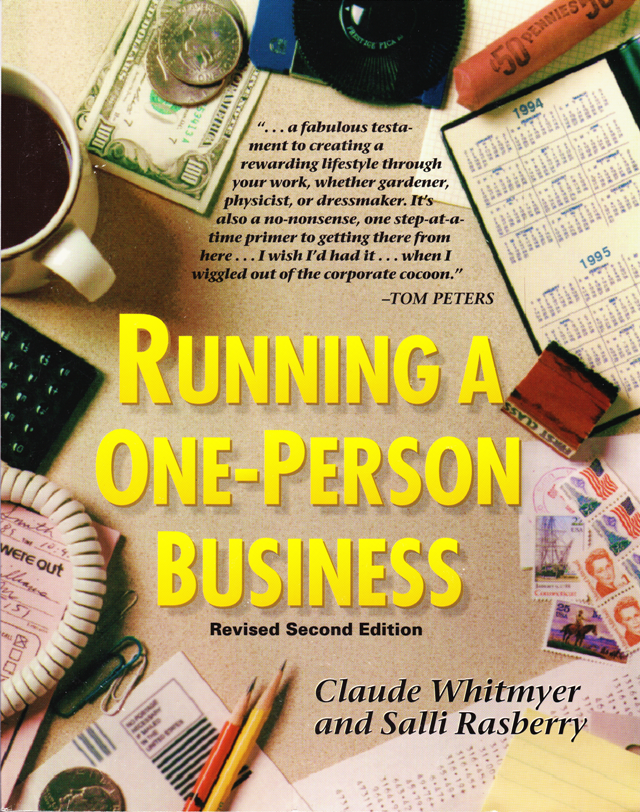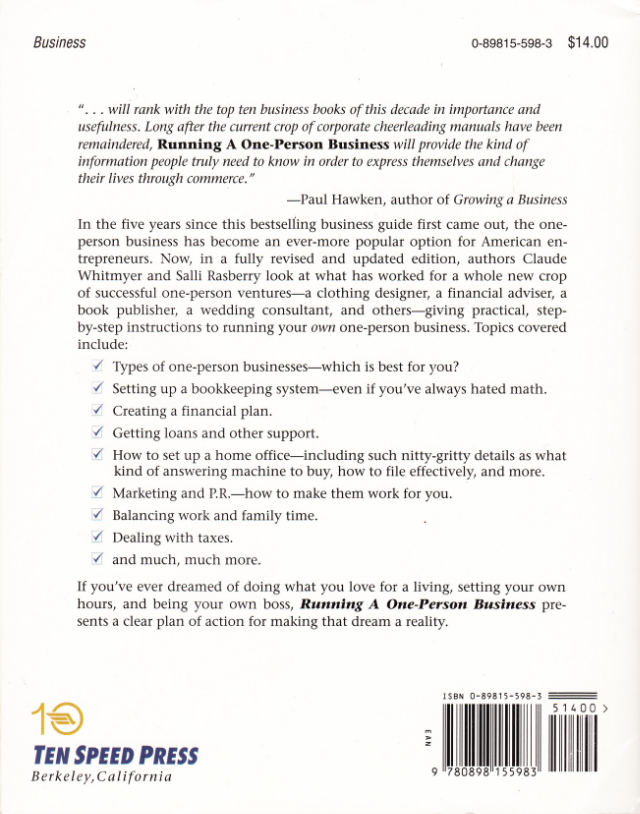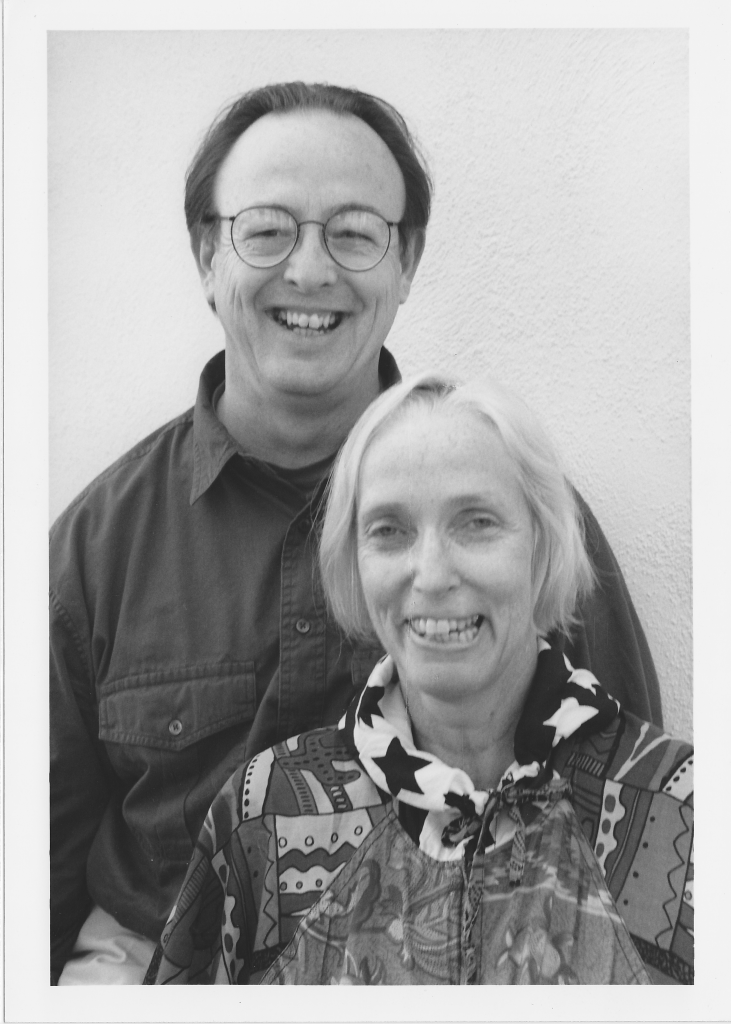Running a One-Person Business
Business as Lifestyle
Foreword by Tom Peters.
Ten Speed Press, Second Revised Edition, 40,000 copies in print. First Edition, 20,000 copies in print.
” . . . a fabulous testament to creating a rewarding lifestyle through your work, whether gardener, physicist, or dressmaker. It’s also a no-nonsense, one step-at-a-time primer to getting there from here . . . I wish I’d had it . . . when I wiggled out of the corporate cocoon.”
Tom Peters, author of In Search of Excellence and
Re-Imagine: Business Excellence in a Disruptive Age


“. . . will rank with the top ten business books of this decade in importance and usfulness.
Paul Hawken
Author of Growing a Business and Natural Capital.
This book is must reading for anyone who is in business or wants to be; for professionals who need guidance in running their own business from home or in an office; or anyone wanting to get a head start on the money, time, and information management required today.
Running A One-Person Business provides a comprehensive approach to the needs of the “solopreneur” or “company of one.” With interviews of many successful enterprisers who have struck out on their own and stuck with it,
It is brimming with the practical information you need if you are currently in business for yourself or if you are planning to be. Last updated in 1994, 90% of the advice is still as potent today as it was then.
ROPB has been called a “lifestyle handbook” for its in-depth offering of the tips and tools people really need to express themselves through commerce. An excellent manual for one-person business operators, with plenty of helpful advice for businesses of any size.


TABLE OF CONTENTS
- Foreword by Tom Peters
- Introduction: Business as Lifestyle
- Chapter 1. One-Person Business Owners—A Unique Group
- Tradeskill
- Market Focus
- Profiles of Successful One-Person Businesses
- Resources
- Chapter 2. Bookkeeping
- Business—A Set of Measurable Exchanges
- Bookkeeping Basics—Money In, Money Out
- Inventory
- Financial Statements
- Do You Need a Tax Accountant?
- Resources
- Chapter 3. Financial Management and Control
- Understanding Cash Flow
- Business and Financial Planning
- Your Business Plan
- Understanding Working Capital
- Types of Financing
- Resources
- Chapter 4. Financial Strategies
- Strategies for Controlling Expenses
- Strategies for Increasing Income
- Pricing Products and Services
- Credit and Collections
- Customer Service
- Physical Layout
- Resources
- Chapter 5. Information Management
- What is Information?
- Telephone
- Daily Records
- Files
- Information Overload
- Resources
- Chapter 6. Time Management
- Why Manage Time?
- Vision, Purpose, and Goals
- Objectives, Action Steps, and Daily Tasks
- Time Planning
- Billable and Nonbillable Time
- Office Hours
- Meetings
- Resources
- Chapter 7. Setting Up Shop
- The Choice—To Work at Home or Away from Home
- Office at Home, with Family—Special Considerations
- Office Layout
- Rules for Organizing Your Space
- Furniture and Fixtures
- Resources
- Chapter 8. Choosing Office Equipment—High Tech or Low?
- Evaluating Technology—Features versus Cost
- On the Lookout for Technology for Your Busines
- Questions to Ask About Any Technology
- How Much of My Income Should I spend on New Technology
- Resources
- Chapter 9. Grassroots Marketing
- The Case Against Advertising
- Personal Recommendation—The Heart of Grassroots Marketing
- Creating a Marketing Plan
- Publicity
- Marketing Checklist
- Resources
- Chapter 10. Emotional Support Systems
- Stabilization Through Routine
- Overcoming Isolation
- Having Fun
- Getting and Giving Support
- The Importance of Trust in Making Support Work
- Giving Back More Than You Get
- Handling Emergency Emotional Needs
- Taking Time Off
- Active Health Practices
- Concerns About Old Age
- Chapter 11. Staying a One-Person Business
- The Need for Backup
- The Perils of Managing Others
- The Importance of Good Suppliers
- The Value of Client Contracts
- How to Stay Current in Your Field
- Resources
- Appendix: Start-Up and Legal Matters
- Business Start-Up Basics
- The Legal Form of Your Business
- Resources
- Index
One-Person Business Owners: A Unique Group
(Excerpts from Chapter 1 of Running a One-Person Business)
One-person businesses can be found nearly everywhere, and they earn a wide range of incomes. Consider the oil traders who buy and sell drilling rights worldwide and deal in millions of dollars from their home phone. Or the arbitragers and bond dealers working on investment portfolios of their own, with just a telephone and a rented desk in the back of some brokerage office. These one-person businesses are often major forces in the financial market.
In the political realm, a lobbyist in Washington, D.C., and a private consultant specializing in policy analysis are among the best-paid and most influential people in our nation’s capital. Both run quiet, behind-the-scenes, one-person businesses.
There are also professional one-person businesses such as realtors, consultants, accountants, speakers, trainers, free-lance editors, psychotherapists, and tax preparers.
Some one-person businesses are retailers, for example, the flower shops, juice bars, and food carts that flourish in many cities. There is a fellow in Seattle, Washington, who motors his little boat around Lake Union selling espresso and croissants to houseboats, ships at anchor, and shoreline offices. And we’ve encountered many a homey resort-town gift shop catering to the many tourists who drive through each year.
Traditionally, many service trades have been run as one-person businesses, including, housekeeping, beauty salons, shoeshine stands, tailoring, plumbing, carpentry, fortune-telling, child-care providers, and mechanics. The last twenty years have seen a proliferation of service providers as more and more women join the workforce and households with two wage earners become the norm. As Americans work longer hours and are under more stress many new market niches have been created in the personal service and alternative healing fields which include: herbalists, personal trainers, acupuncturists, aura and angel readers, channelers, and practitioners of bio-feedback.
Regardless of the field, it takes a certain turn of mind, some unique skills, and a big dollop of realism to successfully run a business on your own. A one-person business is not primarily a stepping-stone to a bigger enterprise, though you could use it in that way. People run one-person businesses because they prefer that form of business. They like the opportunities and freedoms it gives them — to enjoy more agile and expansive personal lives, to express their political and ethical values, to play a larger role in their communities, and, in some cases, to pioneer new fields.
Having control over their work coupled with the joy and security that comes from expressing their internal vision plays a primary role in why people choose to start a one-person business. Increasingly people are feeling the need to make a difference, to take charge of their lives as testified to by the following statements of some of the people we interviewed for this book:
A lot of my friends who are employed are scared to death their going to lose their jobs. I have a friend who has been unemployed for two years and can’t find a job. She was laid off after 14 years. I feel there’s a lot more security in being self employed. My business can go up and down but no one’s going to fire me. I’ll always have a job.
I have control of my life and my time, the rhythm that seems right to me on a daily basis and I don’t have to answer to someone else. Being self employed means I can say yes or no to projects I want to work on. As an employee no matter how many of your own projects your impassioned about there will always be the boss saying you gotta do this I’m assigning it to you.
I think part of why other people think of running a business as such a risk is that it’s not part of their life. To me it’s a natural extension of what I do anyway. It doesn’t feel like I’m working when I’m working. It’s an incredibly good feeling to know that what I’m doing has an impact, that I am helping people achieve peace and health and harmony in their lives. I no longer feel the separation that I had when I worked for someone else and had a work life and a personal life and there was a line down the middle. Now that line is totally blurred. Its really nice. I feel like my life and my work are of a piece.
Patti Breitman, Book Agent
Being self employed . . . . once your successful . . . . the real benefits are almost boundless. Even though there are none of the traditional benefits. There is no time and a half . . . . no vacation pay . . . . there’s none of that. I have to salt money away for that. But I personally wouldn’t trade working on my property out here in the country . . . . looking at the redwoods..watching the birds in the feeder in my wife’s garden with my children running around, for anything. I don’t know how I could have a better life really. I’m crazy about what I’m doing. I have my moments of frustration and then I think . . . . would I rather be working for another lab and boy I get my priorities straight. I all of a sudden realize how great it is in spite of the few frustrations here and there. It could be a lot worse and it couldn’t be a lot better.
Don Anderson, Anderson Dental Studio
I think having a one-person business is about control . . . . control of your life and your time . . . . not having to answer to someone else. While I was getting my masters degree I worked at a bookstore and for those three years I had the experience of being an employee. Although I liked being part of a group and the sense of having colleagues and going someplace and seeing people everyday . . . . I hated the fact that when I was tired and ready to stop I couldn’t. At 4:00 in the afternoon, when I was ready to exercise and go have dinner, I had to keep working. I was not efficient during that time and it didn’t make sense. I couldn’t pay attention to my own body rhythms . . . . I couldn’t work when I was best able to and most productive . . . . I had to work according to their time clock and not mine.
I see myself doing this forever. I love it. Its ideal. I just think I’m the luckiest person in the world when I wake up in the morning to have the flexibility . . . . the control of my time . . . . the time to write . . . . the time to exercise in the afternoon . . . . walk and do yoga. I never commute . . . . I stay home if its gray and rainy and I don’t want to go out . . . . if I don’t want to go to the office I don’t. Its wonderful . . . . who can complain?
Dorothy Wall, Writing Coach
There are times almost everyday that I get this little chill that runs through my body and I go . . . . wow! . . . . I’m really enjoying this day . . . . I’m having a good time . . . . I make some money . . . . I’m in control of my life doing what I want to do, not what someone else wants me to do. What more could you ask for? I feel like I’ve gotten to a place I’ve always wanted to be. Its great. Sure I could make more money if I went to work for Hewlett-Packard or someone like that, but why? The money is not what its all about. For me at least. Its about having that feeling every day. Where your driving down the road and your sitting there thinking ‘I’m as happy as I can be and I’m working. I’m being a productive member of society and enjoying it and getting paid for it.’
John Parry, Solar Works
I have two kids and there’s no question that my priority is to be a good mother. Everything about my work would probably be more if I didn’t have children but it’s very important to me to do a good job raising them. And I think compared to friends of mine who have other kinds of jobs and have the same juggling act to do I feel really lucky because I’m flexible in my hours. I can take the boys to a soccer game and get up a little earlier so I have my time in the studio or pick them up from the soccer game and then go out to my studio. I have that kind of flexibility which a lot of people who are more connected to an institution or some kind of job can’t have.
Pam Glasscock, Fine Artist
My work is very preventative and helps me be in tune with something bigger than myself. I guess it is the spiritual aspect of preventative medicine–something more than you–not just your little self. It does use the biological as a way to the spiritual but there is nothing churchlike about it.
The fact that it is in service of something cogent that rebounds back to me and is also serving something bigger than myself is very satisfying. That satisfaction and the freedom of choice can also be hugely distressing. I’m learning how to enlarge my capacity for not knowing and being in chaos and turmoil. By my actions I learn what comes back very quickly and it’s usually in a way that is salutary. It gives me a great sense of well being.
Robert Rovin, Rosen Bodyworker